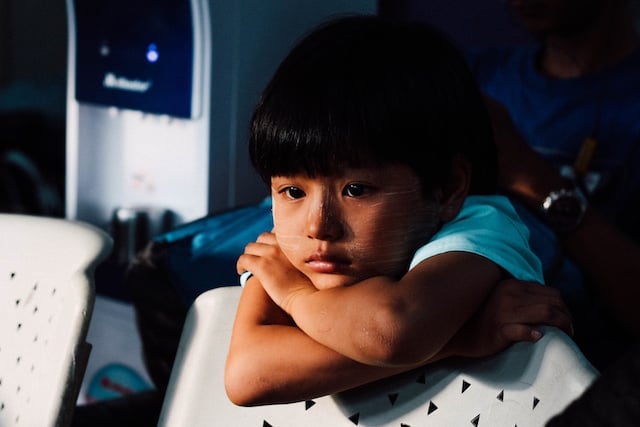
Just one month ago, people were celebrating amazing moms by taking them out to brunch, buying them flowers, and showering them with extra love.
But for those of us who have lost our moms, it was a time of quiet sorrow.
And now, Father’s Day is here. Once again, the messages to celebrate our dads are all around.
But what if you’re not feeling the joy? What if Father’s Day isn’t a day of celebration for you?
I have the fortune of still having my dad here on Earth, and I’m looking forward to being with him this Sunday.
But I’ve spent so much time this week thinking about all the children out there who won’t be with their dads—either because their dads have died or because they chose not spend the day with them—and the dads who will quietly watch the day go by as others celebrate.
These holidays were meant to highlight the love we have for our parents. Yes, they are also highly commercialized events where the true meaning is often lost, but let’s bring that core meaning back to the forefront for a bit here.
Our dads helped bring us into the world. They are a necessary part of the equation of creating the miracle of life. They too come from families where they had dads who gave them life.
And those dad-child relationships aren’t always simple and healthy. In fact, they’re often complex.
What we don’t realize about Father’s Day—often until we’ve lost our dads or have a strained relationship with them—is that it’s not just about celebration. Father’s Day can also bring up unresolved wounds we have in our relationships with our fathers.
And, let’s face it. Many of us have some wounds still lingering around that we’d rather not look at. It’s an uncomfortable place to hang out—I get it.
If you’re grieving the loss of your father, are choosing to keep your distance from him this Sunday, or are a father who will be silently watching other families celebrate as you sit with the reminder that your kids aren’t with you, here are some actions you can take to help ease any burden or extra weight that you may be holding onto.
What to do when you’re not feeling the joy of Father’s Day:
1. Accept our situation as it is.
Relationships aren’t always easy. And the relationship with our parents? Well, those are the hardest of all.
If there’s unfinished business with your dad that’s led you to emotionally distance yourself, or if you’re a dad who knows your kids don’t want to spend time with you, acknowledge it. If your dad is no longer on this earth, recognize that truth. He’s gone.
By accepting our reality without trying to change it—even as painful as it may be to do so—we release ourselves from putting energy into trying to make something different than what is. When we acknowledge what we’re dealing with, we can better work through it, because we’re not trying to avoid or change what’s already occurred.
Our energy is then freed up to help you move forward, not to stay stuck in the past.
2. Understand where we are and where we want to be.
When we have hurt, anger, or sorrow around the relationship with our dads (or children), they manifest like weeds if left unaddressed. The unfinished business of healing what’s been hurt is still there—and without us knowing it, we’re actively feeding those weeds by not dealing with things.
Here’s an example. Imagine you see a small bump on your finger, but choose to ignore it. Over the following days, it starts to grow. You tell yourself, “I’ll deal with it later, I’m too busy right now to schedule an appointment with the doctor.” Next thing you know, you have a big wart on your finger.
The same thing happens when we don’t clean out our emotional wounds.
To release ourselves from the burden of having those emotional warts, we need to understand how they got there to begin with and determine how we’d like to heal them moving forward.
Take time to understand your relationship with your father, whether he’s alive or deceased. If you’re a dad, do the same in regard to your relationship with your child. Think about how your relationship has impacted your life. Then, determine where you’d like to be with your relationship.
One powerful way to do this is to ask yourself: If I was on my deathbed right now, what, if anything, would I regret not having done to heal my relationship with my dad (or child)? Then, go take action to ensure you don’t have those regrets later on.
3. Practice being grateful for what we do have.
Gratitude is often seen as an insignificant act of finding rainbows and unicorns in a situation where we only see darkness. But it’s far from that.
Gratitude is a way to shift our minds away from the negative feedback loop that keeps us stuck in believing things will only be a certain way (for example, things will never improve with my dad, or I can never get over losing my dad, or my children will never change).
It helps us make room for the thoughts that will support what you want to have with your dad moving forward.
Ask yourself: What do I appreciate about my dad (or child)? What do I thank him for? How has he positively shaped my life and who I am today?
The more gratitude you can cultivate in your heart, the more capable you’ll be to free yourself from the torment of staying stuck in believing things will only a certain way. And, you’ll be able to move on to the next step—forgiveness—with more ease.
4. Forgive.
As I mentioned earlier, the relationships we have with our dads aren’t always easy and simple. And Father’s Day is like a mirror being held up in our faces to remind us of what was hard. If you know you’ve got some unresolved stuff with your dad (or child), or you’re devastated or angry that he’s no longer in your life, it’s time to consider forgiveness.
When we keep things unresolved with our dads (or children), we’re making a choice to hold onto those emotional weeds that, over time, fill up our hearts and give us less room for what we desire.
The choice to hold onto the hurt is also a choice to keep ourselves in suffering. In my work as a psychotherapist, I’ve frequently found that the reason people will do that is because they don’t believe they deserve better. They punish themselves—even if it looks like they’re punishing their dad—because there’s an absence of self-love.
Take time to sift through your experience and ask yourself, “Is there anything I’m not forgiving within me that is keeping me from forgiving my dad?” Seek the support of others to help you with this, as forgiveness isn’t easy. Whether it be a professional counselor or therapist, a healer, or a pastor, receive their support to help you heal.
5. Say goodbye to what we’re ready to let go.
This Father’s Day, amidst all the celebration around you, make room to honor what you’re ready to let go of so you can make room for more of what you desire.
Maybe we’re ready to let go of some of our anger and allow joy to enter. If that’s the case, spend time on the phone or in person with your dad talking about things you enjoy together.
Perhaps we’re ready to let go of the belief that we’re always going to suffer having lost him. To honor that decision, choose to celebrate his life this Sunday. Focus on what you’ve gained through his loss and memorialize it through a ritual of your choosing. It can be as simple as saying a prayer of gratitude or visiting his grave while you tell him what you love about him.
Keep your actions focused on the celebration of his life and the gratitude you have for how he positively shaped who you are today.
For all the children who have lost your dad, I honor you. For the dads who won’t be spending the day with your children, I understand your pain. For those of us who have chosen to keep our distance from our dads because of unresolved hurt, I hope you will consider opening the door to new possibilities with your dad that will liberate you from the shackles of regret and remorse.
Let’s take this Father’s Day to embrace whatever wounds have surfaced and amidst the happy faces all around us, know that we deserve to heal and live a life that’s unburdened by the past.
~
~
Author: Gladys Ato
Image: Chinh Le Duc/Unsplash
Editor: Callie Rushton
Supervising Editor 1 & 2: Catherine Monkman











Read 1 comment and reply